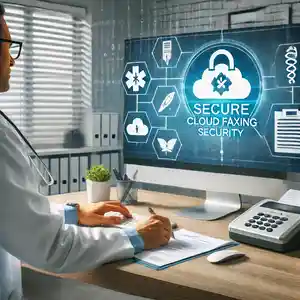Enhancing Security in Healthcare Workflows with Cloud Fax Service
Cloud faxing has revolutionized the way healthcare providers manage the transfer of sensitive information, offering enhanced security and compliance with privacy laws. Discover the benefits of integrating cloud fax services into healthcare workflows to improve efficiency and reduce costs.

With all the news about FHIR and HL7 and healthcare "transformation" you'd think that faxing is on the way out. Nothing could be further from the truth. Faxing has remained essential in sectors that handle the transfer of sensitive and confidential information, such as healthcare.
Nowadays, faxing has largely transitioned to the cloud. Cloud faxing is more similar to email than traditional faxing, making it particularly useful for young medical professionals who are more accustomed to using online services than standing in front of an old analog fax machine.
Let's explore the benefits of cloud faxing services in a healthcare context.
What Are Cloud Faxing Services?
Cloud faxing services enable sending and receiving faxes via the Internet instead of through a traditional fax-to-fax setup. This means no phone lines or strange beeping noises, just quiet, seamless data transfer directly from the cloud. This allows healthcare providers to quickly and securely send documents among providers, payers, and ancillary services.
Cloud Faxing Offers Encryption and Security
Security is paramount when dealing with sensitive patient information, and cloud faxing is one of the safest means of data transfer. Cloud faxing services provide encryption to protect the transmission of faxed documents and use secure protocols, like HTTPS (TLS 1.2+), to ensure all data traveling to and from the cloud is secure. Additionally, cloud faxing provides an audit trail, tracking who sent and received faxes and whether they were successfully delivered.
Cloud Faxing Services Support HIPAA Compliance
Healthcare providers are subject to strict privacy laws, depending on their location. Cloud faxing is compliant with these laws, offering a legal way to send and receive confidential patient data. In the United States, most cloud faxing services comply with the Health Insurance Portability and Accountability Act (HIPAA) due to their encryption and password-protection features.
While some fax services claim to be HIPAA compliant, WestFax is one of the few that has been audited and offers HIPAA Compliance attestation
Cloud Faxing Improves Workflow Efficiency
Moving traditional faxing to the cloud allows healthcare providers to significantly reduce paper use. This leads to more efficient document handling and better transparency, as receiving faxes electronically reduces the number of lost or misplaced documents. Cloud faxing also supports remote work, enabling employees to send and receive faxes from home if their organization allows remote work.
WestFax specializes in workflow management and integration with most EHR's. Whether a native integration or dropping faxes and meta-data into a drop folder for ingestion into an EHR, WestFax can handle even the most complex workflows with ease.
Cloud Faxing Services Lead to Cost Savings
By eliminating traditional fax machines, healthcare providers can save substantially on purchasing, overhead, and maintenance costs. The absence of paper use in cloud faxing provides further budget relief. Furthermore, cloud faxing doesn't require dedicated phone lines, eliminating telecommunication expenses.
To wrap things up, Cloud faxing services provide a secure, efficient, and cost-effective solution for the healthcare industry. By transitioning from traditional faxing to cloud-based systems, healthcare providers can ensure the safe transfer of sensitive patient information, maintain compliance with privacy laws, and improve workflow efficiency. The seamless integration with EHR platforms and print management solutions further enhances the practicality and utility of cloud faxing in medical settings.
Contact us to find out how we can provide a secure, efficient, and cost-effective cloud faxing solution tailored to your healthcare needs.